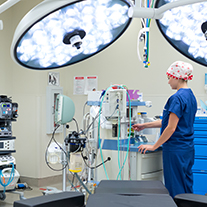
When you are a patient at Iowa Ortho, your physician and the nursing staff go to great lengths to ensure you are in the optimal medical condition to have the best and safest surgical experience.
Preparing for surgery can seem complicated. Patients are given a lengthy list of things that must be done or avoided before a scheduled operation and frequently forget to ask for explanations of preoperative procedures because they are preoccupied with the surgery itself. Preoperative procedures are designed to improve the outcome of the surgery, decrease the risk for complications, and make the surgery as safe and effective as possible.
We all follow these instructions if we have had surgery before, but have you ever wondered why these protocols are necessary? Let’s discuss some of the questions many of us have:
Why do they tell you not to eat or drink before surgery?
Usually, before having a general anesthetic, you won’t be allowed anything to eat or drink. It may seem harsh, not to be able to have even a sip of water, but this precaution minimizes the risk for complications such as vomiting during surgery. This is because when you’re under anesthetic, your body’s reflexes are temporarily stopped. If your stomach has food and drink in it, and you experience vomiting, or regurgitation (bringing up food into your throat) that could affect your breathing and may cause choking. Surprisingly, whatever may be in your stomach can also enter into your lungs. Solid or semi-solid stomach contents may not let your lungs get air. Liquid stomach contents that are acidic may burn your lungs and stop you from getting air. Both types of aspiration may cause brain damage or even be fatal. It is well worth giving up food and drink for a mere 8 hours or so, to ensure you do not incur these types of complications.
Why does your physician ask you not to take aspirin, Coumadin, or any anti-inflammatory medications up to one week prior to surgery?
Discontinuing prescription and over-the-counter medications that “thin” the blood, such as Aspirin, Aleve, Tylenol, etc. (all considered NSAIDS) is necessary prior to surgery. These drugs can increase the risk of bleeding. Whether a drug is withheld or administered is based on the patient’s medical condition, the type of drug, and the scheduled surgical procedure. Patients who take prescription medications on a regular basis must discuss this with the surgeon. NSAIDs, however, delay bone healing through their inhibition of prostaglandins which is a vital component in orthopedic surgery.
Surely chewing gum or mints is no big deal before surgery?
It has been found that chewing gum before surgery increases the production of saliva and thus the volume of stomach liquids which can affect the level of stomach acidity in a way that could elevate the risk of complications.
No vitamins either?
Your doctor might ask you not to take vitamins before surgery due to some vitamins’ effects on bleeding and blood clotting. For example, vitamin E can increase your risk of bleeding if consumed in large doses. Refraining from vitamin supplements before surgery helps ensure you will not have abnormally high levels of vitamin E and can help with your healing process.
The physicians at Iowa Ortho explain they are not trying to be unreasonable with these types of requests, but only to ensure the safety of their patients when having an orthopedic surgery. If you have other questions, the physician and staff at Iowa Ortho are always here to assist you. Give us a call today at 515-247-8400.
